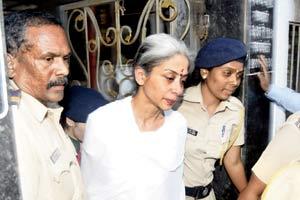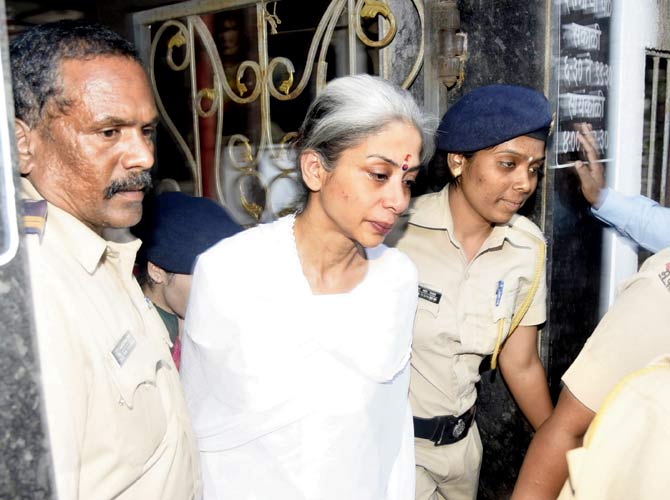As Hinduja confirms high levels of anxiety drug, it has emerged that there has been a delay in transporting Indrani's samples to the state forensic laboratory


Indrani Mukerjea. File pic
It took more than 55 hours for Indrani Mukerjea's blood, urine, and stomach wash (gastric lavage) samples to reach the State Forensic Science Laboratory (FSL) in Kalina from JJ hospital in Byculla. The samples were collected on Friday night after she was admitted to the Critical Care Unit (CCU) and were handed to the police at 8.15 am on Saturday.
Interestingly, even if the vehicle took the longest route, the distance from JJ Hospital to the FSL via the Eastern Freeway, a distance of approximately 25.7 km, would take only 51 minutes. The sample comprising urine (4 ml) and gastric lavage (5 ml) was delivered only at 3 pm on Monday.
mid-day's April 9 report 'Doc to the rescue as constable spills Indrani's samples', spoke about how Constable S P Rathod, who collected the sample on Saturday at 8.15 am, returned to the hospital two hours later stating that the urine sample had leaked and another sample had to be given to PSI Rupesh Patil to deliver to the FSL.
Highly placed FSL sources clarified that the JJ Marg police had come to the laboratory on Saturday evening at 5 pm with the samples, but the same could not be accepted as they did not have labels or the mandatory proforma form describing the nature of tests to be conducted.
"The next day being a holiday [Sunday], the samples were brought to us only on Monday, after which we started our work," a forensic scientist at the laboratory said. A senior doctor attached to JJ hospital confirmed that the sample that was given to the police officer at 12 pm on Saturday was returned to the hospital around 7 pm the same day, as it was not accepted by the FSL.
"We had preserved extra samples of Indrani's urine and gastric lavage and handed them over on Monday, along with the required labels and proforma form," the doctor said.
When asked whether a delay in submission of samples, which was exposed to different temperatures (refrigeration, room temperature and external heat), would have any impact on the sample findings, the forensic scientist, said, "As we will be checking for drugs and chemicals, the delay in submission of samples, or temperature should not have any significant impact. But, had this been a case for alcohol detection or any other volatile component, such delays and temperature variation would have severely impacted the results."
Dr Rukmini Krishnamurthy, former director, FSL, said, "The delay in submission of samples would have surely impacted the findings had the detection been for a volatile component from the sample. However, in the case of a drug test, where toxic chemical components might remain in the urine, a blood sample along with urine sample would have been very useful."
High levels of Benzodiazepine confirmed
Indrani's urine sample sent for toxin screening on Saturday afternoon to the Department of Laboratory Medicine at PD Hinduja Hospital tested positive once again for high levels of Benzodiazepine. The level found this time was 6,468 ng/ml, which is much higher than the last time (in October 2015). While FSL's reports on toxins were negative, Hinduja's reports at the time confirmed 2,088 ng/ml of Benzodiazepine, a drug used for treating anxiety, and it was learnt that Indrani was under psychiatric medication for depression." The permitted level of Benzodiazepine is 0-2 ng/ml.
Dr Sudhir Nanandkar, dean of Grant Medical College and JJ hospital said, "The Hinduja Hospital report was crucial, and confirmed our diagnosis and line of treatment. We now know that a high level of Benzodiazepine was responsible for her falling unconscious on Friday." When asked if Indrani has revealed the name of the tablet she had consumed, the dean said they had not asked her about it nor would they in future. She will be referred to the psychiatry department, who will be evaluating her case and will also be interviewing her in detail.
And, on her pneumonia, another doctor said, "Indrani continued to have fever and is responding well to the antibiotics. She is conscious and is responding to oral commands and is also on liquid feed." Indrani is currently under care and treatment of Dr Wiqar Shaikh, professor of medicine, and head of unit 5, JJ Hospital.
Meanwhile, a doctor at JJ said, "This is the second time that Indrani has tested positive for Benzodiazepine, and had there been a further delay in bringing her to hospital, it would have been life threatening." The Byculla jail officers have already clarified that medicines prescribed to Indrani by jail doctors are given strictly under supervision. This means, a probe needs to be conducted to find out what happened after she stepped out for court hearings.
Also read: Doctors confirm medicine overdose in Indrani Mukerjea's case, police to launch probe
Catch up on all the latest Mumbai news, crime news, current affairs, and also a complete guide on Mumbai from food to things to do and events across the city here. Also download the new mid-day Android and iOS apps to get latest updates
 Subscribe today by clicking the link and stay updated with the latest news!" Click here!
Subscribe today by clicking the link and stay updated with the latest news!" Click here!









